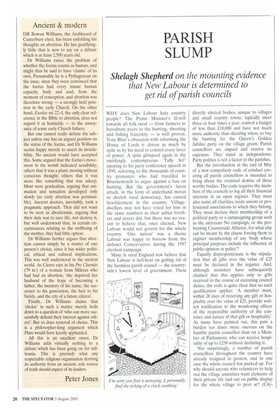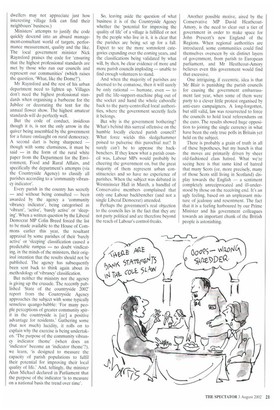PARISH SLUMP
Shelagh Shepherd on the mounting evidence
that New Labour is determined to get rid of parish councils
WHY does New Labour hate country people? The Prime Minister's
towards all folk rural — from farmers to hereditary peers to the hunting, shooting and fishing fraternity — is well proven. Tony Blair's obsession with reforming the House of Lords is driven as much by spite as by his need to control every lever of power. A spite glimpsed again in the smirkingly contemptuous 'Tally ho!' opening to his party conference speech in 1999, referring to the thousands of country protesters who had travelled to Bournemouth to argue against a ban on hunting. But the government's latest attack, in the form of underhand moves to abolish rural democracy, has caused bewilderment in the country. Villagedwellers may not have voted for him in the same numbers as their urban brothers and sisters did, but there was no reason to believe that, once elected, New Labour would not govern for the whole country: 'One nation' was a theme Labour was happy to borrow from the defunct Conservatives during the 1997 election campaign.
Many in rural England now believe that New Labour is hell-bent on getting rid of the harmless parish council — the countryside's lowest level of government. These directly elected bodies, unique to villages and small country towns, typically meet three or four times a year, control a budget of less than £10,000 and have not much more authority than deciding where to buy the bunting for the Queen's Golden Jubilee party on the village green. Parish councillors are unpaid and receive no expenses. They stand as independents. Party politics is not a factor in the parishes.
But the introduction at the end of May of a new compulsory code of conduct covering all parish councillors is intended to bring about the eventual demise of these worthy bodies. The code requires the members of the councils to log all their financial interests in an open register. They must also name all charities, trade unions or professional associations to which they belong. They must declare their membership of a political party or a campaigning group such as the anti-euro No campaign, or the prohunting Countryside Alliance, for what else can be meant by the clause forcing them to register membership of any 'body whose principal purposes include the influence of public opinion or policy'?
Equally disproportionate is the stipulation that all gifts over the value of £25 must be declared in the register. And, although ministers have subsequently claimed that this applies only to gifts received in the course of executing council duties, the code is quite clear that no such qualification applies: 'A member must, within 28 days of receiving any gift or hospitality over the value of £25, provide written notification to the monitoring officer of the responsible authority of the existence and nature of that gift or hospitality'. As many have pointed out, this puts a burden ten times more onerous on the humble parish councillor than on a Member of Parliament, who can receive hospitality of up to £250 without declaring it.
Not surprisingly, a number of parish councillors throughout the country have already resigned in protest, and in one case the whole council has packed up. For why should anyone who volunteers to help run the village amenities want elements of their private life laid out on public display for the whole village to peer at? (City dwellers may not appreciate just how interesting village folk can find their neighbours' business.) Ministers' attempts to justify the code quickly descend into an absurd management-consultant world of targets, performance measurement, quality and the like. The local government minister Nick Raynsford praises the code for 'ensuring that the highest professional standards are met by those who run our councils and represent our communities' (which raises the question. 'What, like the Dome?').
Mr Raynsford and the rest of his urban department need to lighten up. Villages don't need the highest professional standards when organising a barbecue for the Jubilee or decorating the tent for the annual flower show. The highest amateur standards will do perfectly well.
But the code of conduct, insidious though it is, is not the only arrow in the quiver being assembled by the government for a future onslaught on rural democracy. A second dart is being sharpened — though with some clumsiness, it must be said — in the form of the rural white paper from the Department for the Environment, Food and Rural Affairs, and specifically the department's attempts (via the Countryside Agency) to classify all parishes according to a 'community vibrancy indicator'.
Every parish in the country has secretly — and without being consulted — been awarded by the agency a 'community vibrancy indicator', being categorised as 'vibrant', 'active', 'barely active' or 'sleeping'. When a written question by the Liberal Democrat MP Cohn Breed forced the list to be made available to the House of Commons earlier this year, the resultant appraisal by some parishes of their 'barely active' or 'sleeping' classification caused a predictable rumpus — no doubt vindicating, in the minds of the ministers, their original intention that the results should not be published. The agency has subsequently been sent back to think again about its methodology of 'vibrancy' classification.
But neither the ministry nor the agency is giving up the crusade. The recently published 'State of the countryside 2002; report from the Countryside Agency approaches the subject with some typically senseless quango-babble: 'For many people perceptions of greater community spirit in the countryside is [sic] a positive advantage for residents.' Gathering some (but not much) lucidity, it rolls on to explain why the exercise is being undertaken. 'The purpose of the community vibrancy indicator theme' (when does an 'indicator' become an 'indicator theme'?), we learn, 'is designed to measure the capacity of parish populations to fulfil their potential for improving their local quality of life.' And, tellingly, the minister Alun Michael declared in Parliament that the purpose of the indicator 'is to measure on a national basis the trend over time'. So, leaving aside the question of what business it is of the Countryside Agency whether the 'potential for improving the quality of life' of a village is fulfilled or not by the people who live in it, it is clear that the parishes are being set up for a fall. Expect to see the more somnolent categories expanding over the coming years, and the classifications being validated by what will, by then, be clear evidence of more and more parish councils imploding — unable to find enough volunteers to stand.
And when the majority of parishes are deemed to be comatose, then it will surely be only rational — humane, even — to pull the life-support-machine plug out of the socket and hand the whole caboodle back to the party-controlled local authorities, where the government secretly feels it belongs.
But why is the government bothering? What's behind this surreal offensive on the humble locally elected parish council? What force wields this sledgehammer poised to pulverise this parochial nut? It surely can't be to appease the backbenchers. If they knew what a parish council was, Labour MPs would probably be cheering the government on, but the great majority of them represent urban constituencies and so have no experience of parishes. When the subject was debated in Westminster Hall in March, a handful of Conservative members complained that only one Labour backbencher (and not a single Liberal Democrat) attended.
Perhaps the government's real objection to the councils lies in the fact that they are not party political and are therefore beyond the reach of Labour's control-freaks, Another possible motive, aired by the Conservative MP David HeathcoatAmory, is the need to clear out a tier of government in order to make space for John Prescott's new England of the Regions. When regional authorities are introduced, some communities could find themselves overseen by six distinct layers of government, from parish to European parliament, and Mr Heathcoat-Amory believes even this government would find that excessive.
One intriguing, if eccentric, idea is that Mr Blair is punishing the parish councils for causing the government embarrassment last year, when some of them were party to a clever little protest organised by anti-euro campaigners. A long-forgotten, but still valid, law was resurrected to force the councils to hold local referendums on the euro. The results showed huge opposition to joining the single currency in what have been the only true polls in Britain yet held on the subject.
There is probably a grain of truth in all of these hypotheses, but my hunch is that the moves are primarily driven by sheer old-fashioned class hatred. What we're seeing here is that same kind of hatred that many Scots (or, more precisely, many of those Scots still living in Scotland) display towards the English — a sentiment completely unreciprocated and ill-understood by those on the receiving end. It's an ugly feeling, based on an unpleasant mixture of jealousy and resentment. The fact that it is a feeling harboured by our Prime Minister and his government colleagues towards an important chunk of the British people is astonishing.



























































 Previous page
Previous page